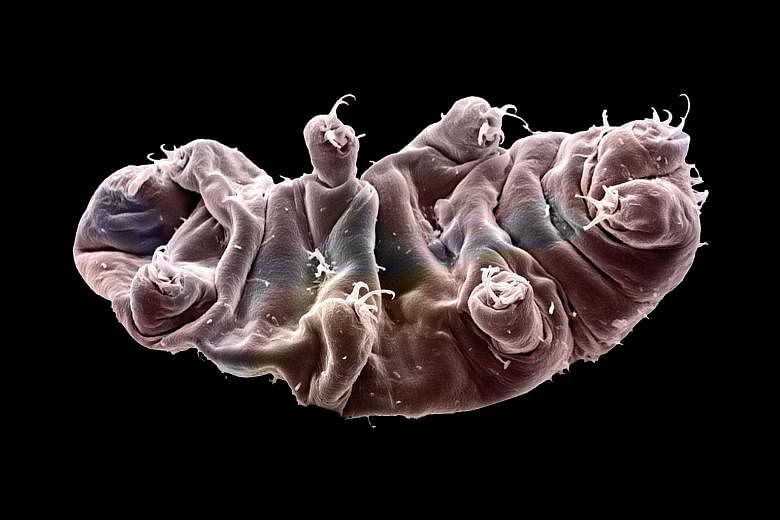PARIS • A protein unique to a minuscule creature called a "water bear", reputedly the most indestructible animal on earth, protects human DNA from X-ray damage, stunned researchers have reported.
Human cells cultivated with the just-found protein, dubbed "Dsup" for "damage suppressor", experienced half as much decay as normal cells when blasted with radiation.
"We were really surprised," said lead author Takuma Hashimoto, a biologist at the University of Tokyo, who designed the experiments.
"It is striking that a single gene is enough to improve the radiation tolerance of human cultured cells," he said on Tuesday, referring to the tardigrade-derived protein.
Tardigrades, as the water bears are more prosaically known, have long fascinated scientists with their veritable superpowers of survival.
Barely the size of a grain of sand, they look as if they escaped from a Star Trek sequel. Seemingly eyeless, they have bodies resembling hazmat suits, eight puffy legs with bear-like claws and a vacuum-cleaner nozzle of a snout.
Most eat moss and lichen. Some feed on other water bears.
These primitive water-dwellers can withstand environments more extreme than anything in nature. That includes being plunged into scalding liquids or frozen at temperatures just shy of absolute zero.
In an earlier experiment, water bears were given a 26-hour bath in -253 deg C liquid nitrogen. All it took was a few drops of water for the critters to spring back to life.
Additionally, some tardigrade species - there are about 1,000 in all - can handle crushing pressure at least six times greater than found at the 11km-deep Mariana Trench in the Pacific Ocean.
Even the ravages of outer space do not seem to faze them. In 2007, thousands of water bears, attached to a satellite, were exposed directly to potentially deadly space radiation in vacuum conditions and then brought back to Earth. Not only did many survive, but also some females later laid eggs which yielded healthy offspring.
Most research has concluded that water bears have a heightened capacity to repair damaged DNA. But in their experiments with human cells, Dr Hashimoto and colleagues found the tardigrade's Dsup protein could also "work as a kind of physical shield to protect DNA" - especially from X-ray harm.
The findings were published in the scientific journal Nature Communications.
AGENCE FRANCE-PRESSE

